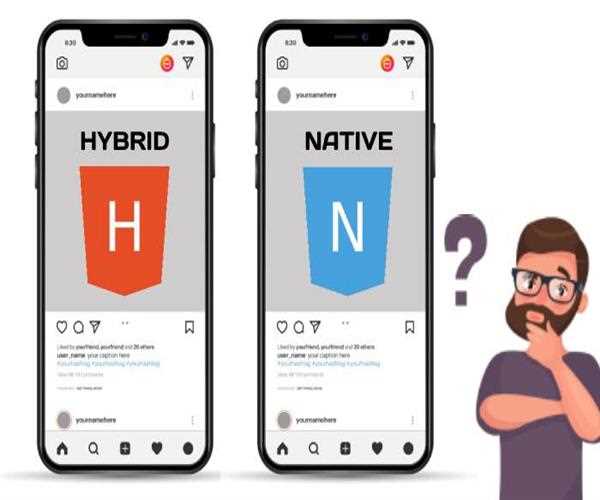If we talk about what is the best resource to get the Smartphone users then what would be your answer. Surely, it would be an app. Because it is only an app that makes the way towards the success of any business through mobile devices. Not only start-up companies but also big organizations across the world are relying on these mobile apps for getting success and clients. In the present time, no one can ignore the importance of having a mobile app in their business. Having a proper mobile marketing plan assure the success of your business.
When it comes to e-commerce business, then it becomes essential to say that the way to increase the sale is only a mobile app. And these apps are showing their impact. Studies say that more than 80% of e-commerce clients come from mobile apps.
But, there is a big confusion regarding which is the best for the business. Hybrid or native. Making a selection between them is not easy. Choosing the
best hybrid mobile app framework can be done by experts only. In this writing, we are going to elaborate on what to choose Hybrid or Native as per your business needs.
Let's start the journey...
Both native and hybrid have their pros and cons. Both offer different functional capabilities to the developers and empower the businesses. This effectiveness has made it difficult for businesses to choose between these two big development approaches.
What are the native apps?
Native from its name we can understand that an app that is created particularly for a dedicated platform is known as a native app. such apps always have tight integrations in that particular platform and ecosystem as well. Therefore, it helps you get a better presentation of your business. One of the biggest examples of such apps is Yelp. However, the downside of the developing native apps or platform-dedicated apps is if you want to benefit both Android and iOS users then you will need to build another version to reach them.
What are hybrid apps?
Developing hybrid apps is always beneficial as there will be no need to develop separate apps for Android, iOS and web apps. It is a cost-effective and time-savvy way. As these apps are intended to offer cross-platform functionality, you can reach iOS, Android and web audiences using just a single development cycle.
These apps are developed using combined technologies like JavaScript, HTML and CSS. The big distinction is that these apps are hosted inside a native app which ahead utilizes WebView of a mobile. Hybrid mobile apps allow users to access the camera, contacts, accelerometer and other capabilities of their mobile device. A well-written hybrid mobile app should not look or behave differently than its native version. But, your users, don't mean to it as they need only a functional app.
If your website offers the best to your needs, then why need an app? Yes, to reduce the cost while synching up with the website faster. But, with lots of advantages, there are disadvantages are also associated with hybrid mobile app development. As it is easy to create and quick, so sometimes you may feel that your app is not fully-fledged and functional, also the user will not get the necessary experience with it. So, while creating your app you must be sure that what different you can offer to your users in a cost-effective and quick way.
Know the best hybrid app framework 2020:
• React Native
• Flutter
• Mobile Angular UI
• Ionic
• Xamarin
• PhoneGap
• Corona SDK
• jQuery Mobile
• Intel XDK
• Appcelerator Titanium
Which you should prefer for your enterprise?
With the above discussion, we can say that hybrid apps take less-time and cost-effective, on the other hand, native apps offer technical advancement and features to the users. Both of these development methodologies have their pros and cons. So, the decision will depend on your business needs and project requirements.
Let us help you choose between native and hybrid mobile app development processes:
Speed and efficiency
Hybrid apps are slower and less efficient than native apps. Lots of changes are already done in the JS interpreter for hybrid apps however hybrid apps are not as efficient and fast as native apps.
Platform Independence
If we look at the platform independence then hybrid apps win the race. One time development can meet requirements for all platforms. So, choose hybrid application development if you want to create a single app for all platforms.
Security concerns
There are multiple security threats are associated with hybrid apps. Every layer in such apps provides a path for risks and attacks. While, as native apps are designed for dedicates OS so there are fewer security threats.
Budget-friendliness
Native apps are less budget-friendly as compared to hybrid apps. A professional developer can build hybrid applications but if you want native application separate for Android, iOS and Windows then you will need multiple professionals that will increase development and maintenance cost as well.
User experience
Users only concern to easy-to-use, friendliness of the app and its functional capabilities to meet their needs. Native apps work faster and offer more effective user experience to mobile users. While hybrid apps do not offer better user experience than native apps.
Updates
Native apps are dedicated to their operating system so for a different OS a separate app will be required. Therefore, for any update, you will require proper testing for different OS. While there is no need to create separate apps for multiple OS. So, a single update can make updates on all devices.
Summary:
Whatever the development process and methodologies you choose, always go with the best option that will assist the users and give them what they are seeking for. However, it is also necessary that doesn't compromise with the prices and cut the needs as it will ruin the idea of app development. No doubt that hybrid app development is the future of mobile apps, but it also has lots of issues that will be fixed soon. However, if you are planning to go native then make it scalable to easily adapt the future changes.




Leave Comment